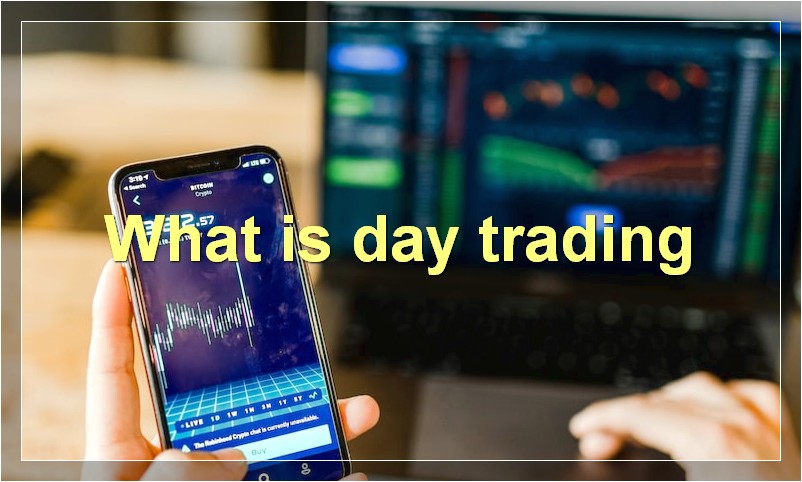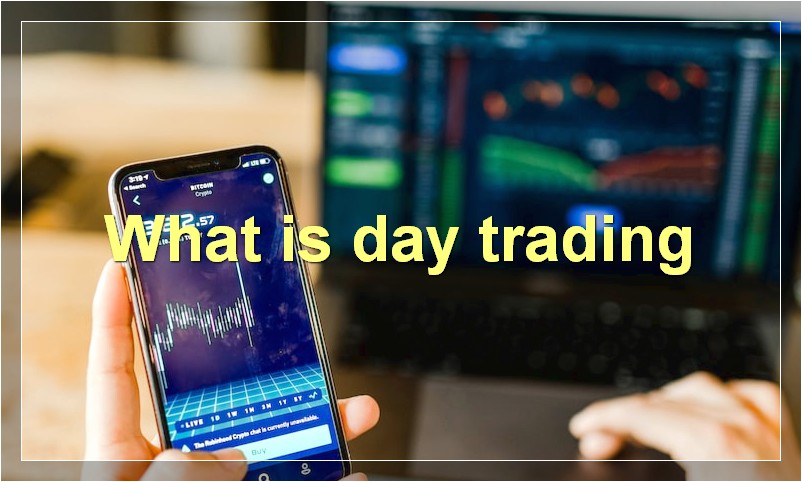Many people are drawn to day trading volatile stocks because of the potential for high rewards. However, there are also risks involved that must be considered before entering this type of trading. This article will explore both the benefits and risks of day trading volatile stocks so that you can make an informed decision.
What are volatile stocks
Volatile stocks are those that see large price swings over short periods of time. They can be risky investments, but can also offer the potential for big profits.
For investors looking to make quick profits, volatile stocks are often the best choice. However, they can also be very risky. The key is to find volatile stocks that are likely to continue their upward trend.
There are a number of factors to consider when choosing volatile stocks. First, it is important to look at the overall market trend. If the market is in a downward trend, it is likely that volatile stocks will also fall. Second, it is important to look at the company’s financials. Strong companies with good prospects are more likely to weather the volatility and continue to grow.
Finally, it is important to use stop-loss orders when investing in volatile stocks. A stop-loss order is an order to sell a stock if it falls below a certain price. This ensures that you do not lose too much money if the stock price falls sharply.
Volatile stocks can be a great way to make quick profits. However, they can also be very risky. The key is to find volatile stocks that are likely to continue their upward trend. By following these tips, you can maximize your chances for success.
What is day trading

Day trading is a type of investing where individuals buy and sell securities within the same day. Day traders typically make multiple trades throughout the day, and their goal is to generate profits from the intraday price movements of the securities they trade.
Many day traders use technical analysis to identify trading opportunities. Technical analysis is a method of predicting future price movements of a security based on past price data. Day traders may also use fundamental analysis to find trading opportunities. Fundamental analysis is a method of analyzing a security by looking at economic, political, and other factors that can affect the security’s price.
Day trading can be a risky investment strategy, and it is important to understand the risks involved before deciding to day trade. Day traders typically use a large amount of leverage, which can lead to large losses if the market moves against them. Day trading can also be very stressful, and some day traders may develop unhealthy habits such as excessive risk-taking and compulsive trading.
Why are volatile stocks good for day trading
There are a few reasons why volatile stocks tend to be good for day trading. For one, when a stock is volatile, it means that its price is constantly changing. This gives day traders more opportunities to buy and sell the stock, and potentially make a profit. Additionally, volatile stocks tend to be more liquid, meaning there are more buyers and sellers, and it is easier to buy and sell the stock without having to wait for someone to match your order. Finally, volatile stocks tend to have higher beta values, which means they are more likely to move in the direction you want them to (assuming you know what you’re doing).
What are some volatile stocks for day trading
There are many volatile stocks for day trading, but some are more volatile than others. The most volatile stocks are typically those with the highest beta values. Beta is a measure of a stock’s volatility in relation to the market. A stock with a beta of 2 is twice as volatile as the market, while a stock with a beta of 0.5 is half as volatile.
How do I pick volatile stocks for day trading
There are a number of ways to pick volatile stocks for day trading. The most important factor is to find stocks that are highly liquid, which means there is a large amount of buying and selling activity taking place. This ensures that you will be able to get in and out of trades quickly and at a good price.
Another factor to look for is a stock that has a wide range of prices over the course of the day. This means that there is a lot of movement and you can take advantage of both the upswings and the downswings.
Finally, it is also important to pay attention to the news. Stocks can become volatile when there is some major news event taking place that could impact the company’s performance. For example, if a company announces poor earnings results, the stock price is likely to drop sharply.
What is the best strategy for day trading volatile stocks

Volatile stocks are those that experience large swings in price over a short period of time. They can be tricky to trade, but there are certain strategies you can use to make the most of their volatility.
One strategy for day trading volatile stocks is to wait for them to settle after a big move. After a stock makes a big move up or down, it will usually consolidates for a while before making its next move. This is your chance to get in at a good price before the stock makes its next move.
Another strategy is to use limit orders. With a limit order, you set a price at which you’re willing to buy or sell the stock. This can help you get into or out of a position at a good price, even if the stock is moving around a lot.
Finally, it’s important to have a plan and stick to it. When trading volatile stocks, it’s easy to get caught up in the excitement and make impulsive decisions. But if you have a plan and stick to it, you’ll be more likely to succeed.
What are the risks of day trading volatile stocks
There are a few risks associated with day trading volatile stocks. First, if the stock price moves against your position, you can lose money quickly. Second, you may have difficulty getting out of your position if the stock price gaps down or up. Third, you may pay more in commissions and fees than if you held the stock for a longer period of time. Finally, you may miss out on potential profits if the stock price spikes after you’ve sold your shares.
What are the benefits of day trading volatile stocks
Volatile stocks are those that experience large swings in price over short periods of time. They can be risky investments, but they can also offer big rewards for savvy investors who know how to day trade them.
Here are some of the benefits of day trading volatile stocks:
1. Potentially high profits. If you pick the right stock and time your trades well, you can make a lot of money from just a few shares.
2. Exciting and fast-paced. Volatile stocks keep you on your toes and can make trading feel like a game.
3. You learn quickly. Making mistakes with volatile stocks is costly, so you quickly learn to become a better trader.
4. It’s challenging. Day trading volatile stocks is not for everyone, but it can be a fun and rewarding challenge for those who are up for it.
Should I day trade volatile stocks
Volatile stocks are those that experience large swings in price over a short period of time. They can be risky investments, but they can also offer the potential for big profits. So, should you day trade volatile stocks?
There is no simple answer to this question. It depends on your investment goals, risk tolerance, and trading expertise. If you are a experienced trader who is comfortable with taking on more risk, then day trading volatile stocks may be a good strategy for you. However, if you are new to investing or not comfortable with taking on extra risk, then you may want to avoid day trading volatile stocks.
What are some tips for day trading volatile stocks
Some tips for day trading volatile stocks include staying up-to-date on market news, using stop-loss orders, and diversifying your portfolio. Staying up-to-date on market news will help you know when to buy or sell a stock. Using stop-loss orders will help limit your losses if a stock starts to drop in value. Diversifying your portfolio will help protect you from losing all of your money if one stock crashes.

